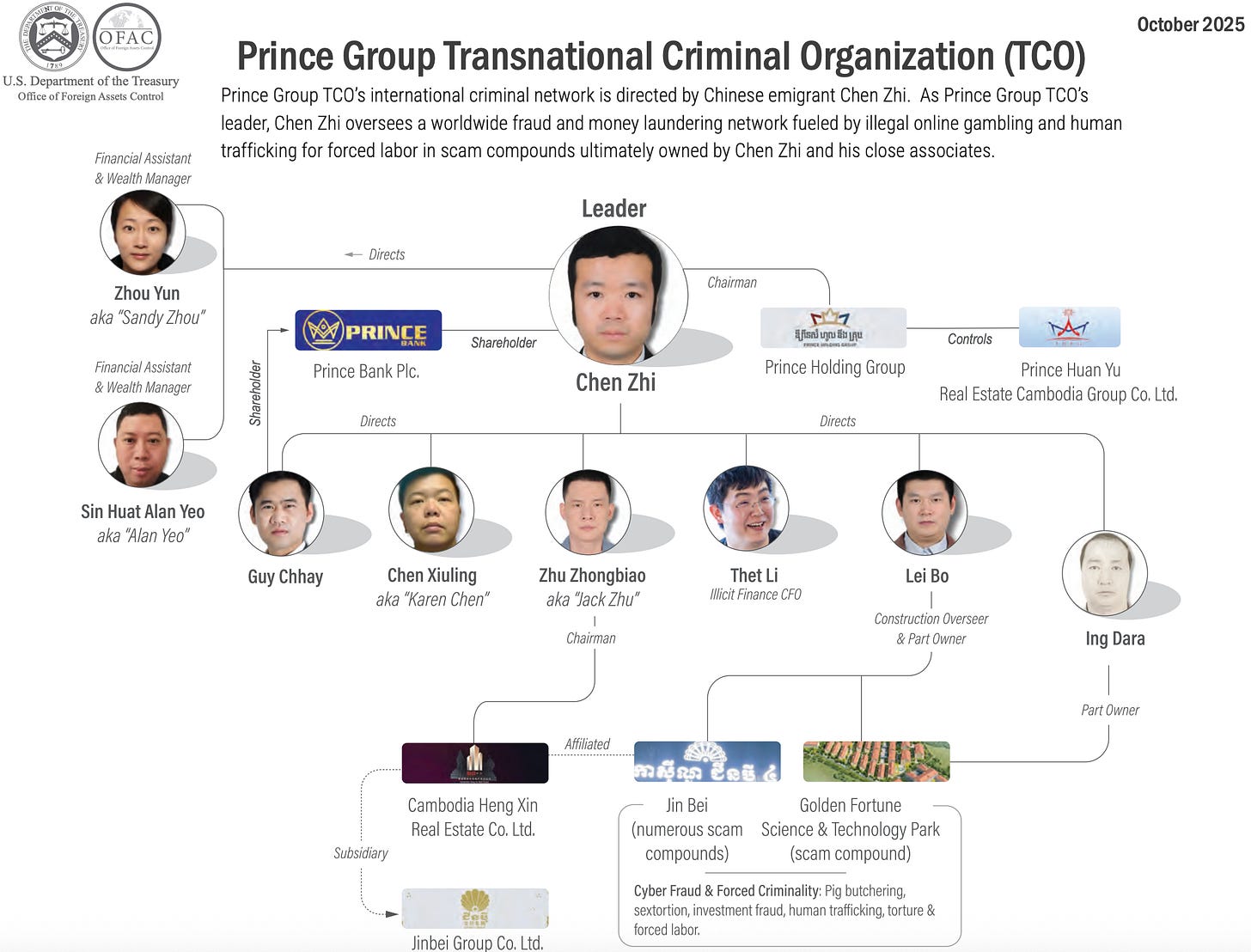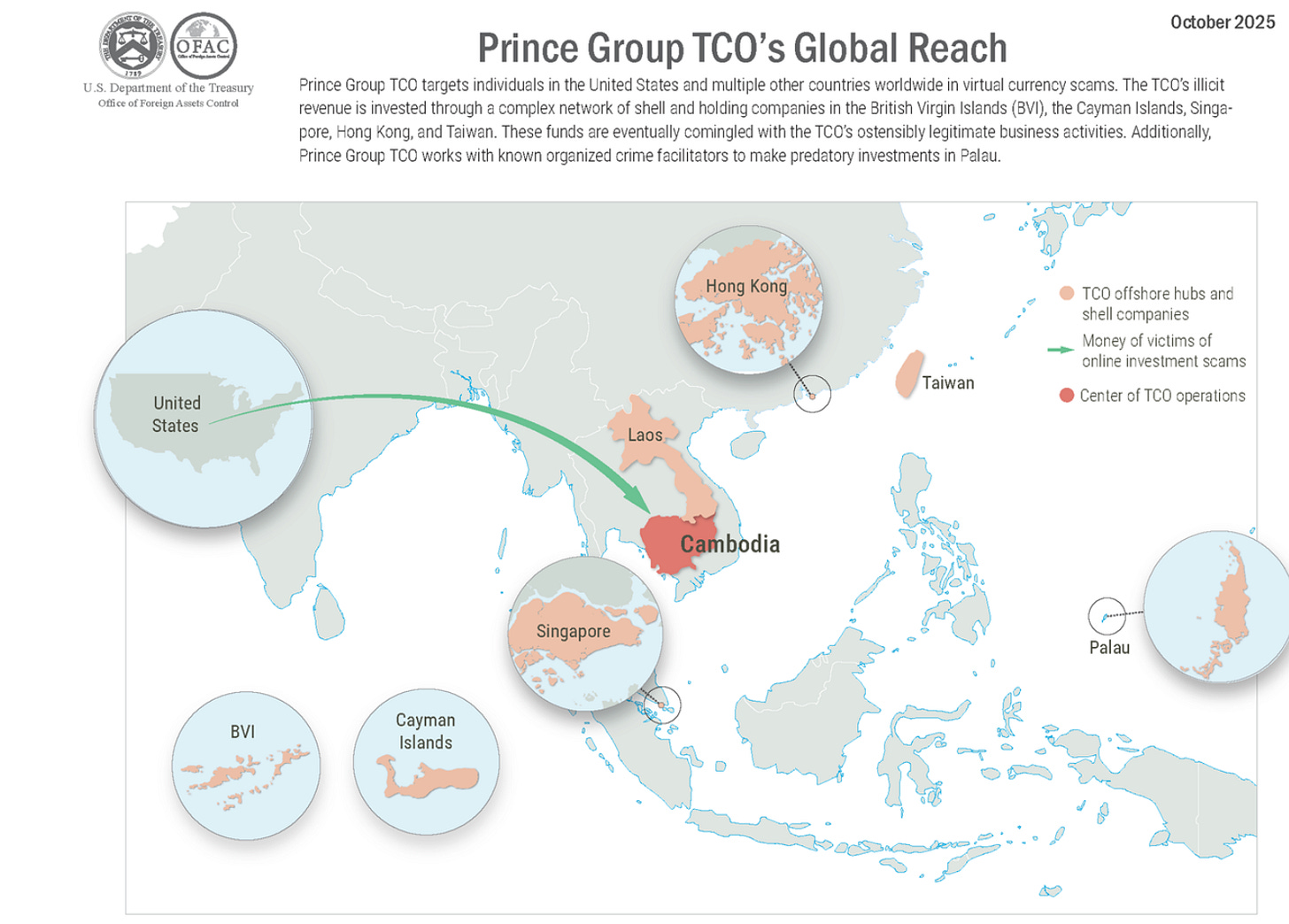Chinese Tycoon Arrested in Cambodian Modern-Slavery Empire Linked to Beijing's United Front
Chen Zhi, the billionaire head of Prince Group, faces U.S. and U.K. sanctions for allegedly running forced-labour cyber-fraud camps and laundering billions through crypto and luxury assets.
WASHINGTON / LONDON — The United States has indicted and sanctioned a Chinese tycoon accused of running a multi-billion-dollar modern-slavery and online-fraud empire from Southeast Asia, explicitly linking his networks to Chinese state actors, the corruption of multiple governments, and Triad-linked drug-trafficking and money-laundering operations.
The case centers on cryptocurrency-based investment frauds — an emotionally devastating form of online scam known as “pig butchering” — and on Cambodia, a nation Western intelligence agencies describe as under Beijing’s strategic influence.
In coordinated announcements, the U.S. Treasury’s Office of Foreign Assets Control and the Financial Crimes Enforcement Network, together with British counterparts, imposed sweeping sanctions on Chen Zhi and 146 affiliated individuals and entities connected to his conglomerate, the Prince Group Transnational Criminal Organization. The joint action freezes assets across Asia, Europe, and the United Kingdom — exposing Triad-linked laundering cells spanning New York and London — and cuts Chen off from the global financial system.
According to the U.S. Treasury, Prince Group profited from “a litany of transnational crimes including sextortion, money laundering, corruption, illegal online gambling, and the industrial-scale trafficking, torture, and extortion of enslaved workers.”
Victims lured to Cambodia by false promises of high-paying jobs were beaten, imprisoned, and forced to run online scams that targeted citizens in the United States, the United Kingdom, and around the world.
According to the unsealed indictment against Chen Zhi, 37, the Justice Department’s National Security Division also filed a civil forfeiture complaint for approximately 127,271 Bitcoin — worth roughly $15 billion — seized from wallets he controlled. It is the largest forfeiture action in Justice Department history.
FBI Director Kash Patel said, “This is an individual who allegedly operated a vast criminal network across multiple continents involving forced labour, money laundering, investment schemes, and stolen assets — targeting millions of innocent victims in the process.”
Treasury officials said Chen and his deputies used political influence and paid bribes to public officials across several countries to protect their criminal enterprise, ensuring the continued operation of scam compounds and illicit finance pipelines.
In the most explicit description yet of Prince Group’s deep entanglement with political systems, the U.S. government stated: “Chen Zhi has directed the flow of billions of dollars in illicit funds in close coordination with vice-chairmen and financial assistants. These associates oversee the operation of both licit and illicit activities, and correspond with banks, government officials, and other witting and unwitting partners on Chen Zhi’s behalf.”
In one of Chen’s most notorious Cambodian slavery camps, the Golden Fortune “technology” compound, witnesses told reporters they had seen workers “beaten until they are barely alive” before being recaptured and forced back inside.
Within these compounds, Treasury said, “workers are often lured by the promise of well-paid jobs in customer service, tech support, and related fields, but are instead held against their will and made to scam people from around the world in so-called ‘pig-butchering’ and other fraud schemes.”
The Cambodia-based cyber-fraud operations rely on prolonged deception: scammers spend weeks or months cultivating false romantic or investment relationships online, persuading victims to invest in fake trading platforms, and then disappearing after draining every account. “The scammers are often victims themselves of human trafficking for forced labour,” Treasury noted. “They are subjected to barbaric methods of control including physical abuse, isolation, and severe restrictions on movement.”
Western intelligence agencies have long described Cambodia — where Chen gained citizenship after migrating from Fujian — as a state effectively captured by Beijing, where Chinese capital, technology, and security cooperation under Xi Jinping’s Belt and Road Initiative have shielded transnational criminal operations. From the mid-2010s onward, Chinese underworld figures — including Triad factions and the “Hongmen” fraternity — established bases in Sihanoukville, converting the city’s casinos and high-rises into nodes for money-laundering, crypto schemes, and online fraud cloaked as BRI investment.
The latest U.S. Treasury sanctions explicitly connect Chen Zhi to Wan Kuok-koi, the notorious Macau Triad boss known as “Broken Tooth.” Wan heads the modern Hongmen association, which U.S. officials describe as “directly linked to the Chinese Communist Party and its United Front Work Department.”
The sanctions also state that Prince Group worked with Rose Wang, a Palau-based organised-crime facilitator who “is the vice-president of Palau’s Overseas Chinese Federation, which may conduct unofficial diplomacy for China.”
In 2018 she introduced Wan Kuok-koi to Palau’s then-President while Wan was seeking casino licences. OFAC had already sanctioned “Broken Tooth” in 2020 under Executive Order 13818 for “spreading crime and corruption across Southeast Asia and Palau.”
By designating Rose Wang in connection with Prince Group’s Palau schemes, the U.S. government effectively linked Chen Zhi to Chinese state-aligned and United Front operations, of which both Wang and “Broken Tooth” are established associates.
Among the most notorious sites under the Prince Group Transnational Criminal Organization are those operated through Jin Bei Group Co. Ltd., a luxury hotel and casino conglomerate that also controls a series of compounds across Cambodia linked to “forced-labour and human-trafficking schemes,” including the site associated with the gruesome murder of 25-year-old Chinese national Yi Ming Dali in 2023.
In a 2022 takedown of a Chinese money-laundering network in New York, the FBI identified 259 U.S. victims who collectively lost $18 million to scammers connected to Jin Bei Group compounds. That figure, the Treasury noted, represents “just one takedown of one network” linked to Prince Group’s operations — and only a fraction of the total losses inflicted on U.S. citizens by the organization’s global scam infrastructure.
Keep reading with a 7-day free trial
Subscribe to The Bureau to keep reading this post and get 7 days of free access to the full post archives.




